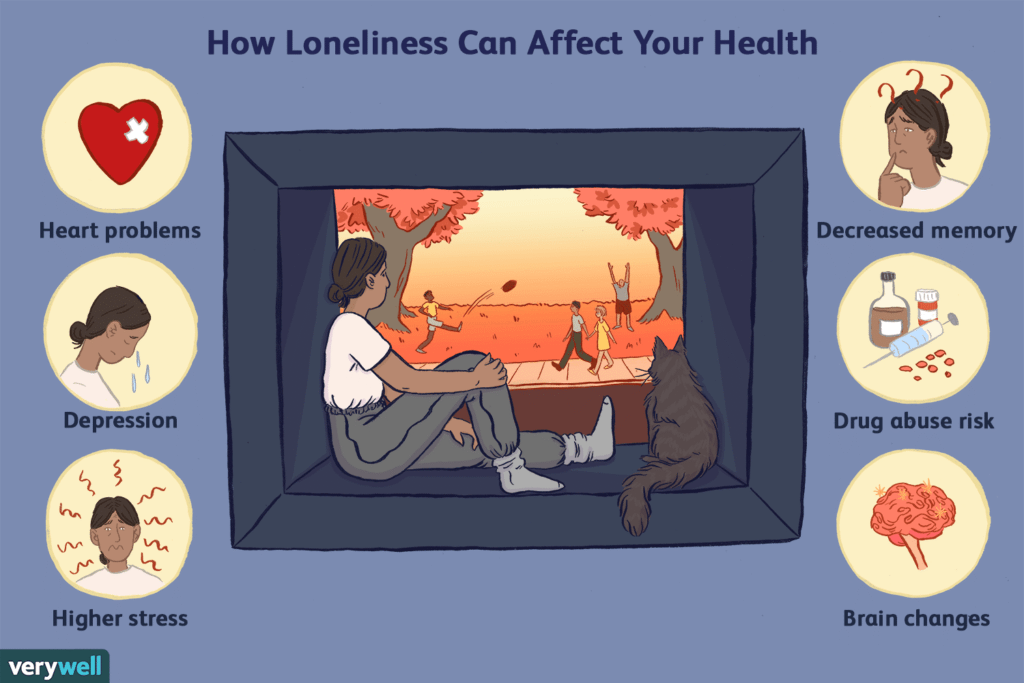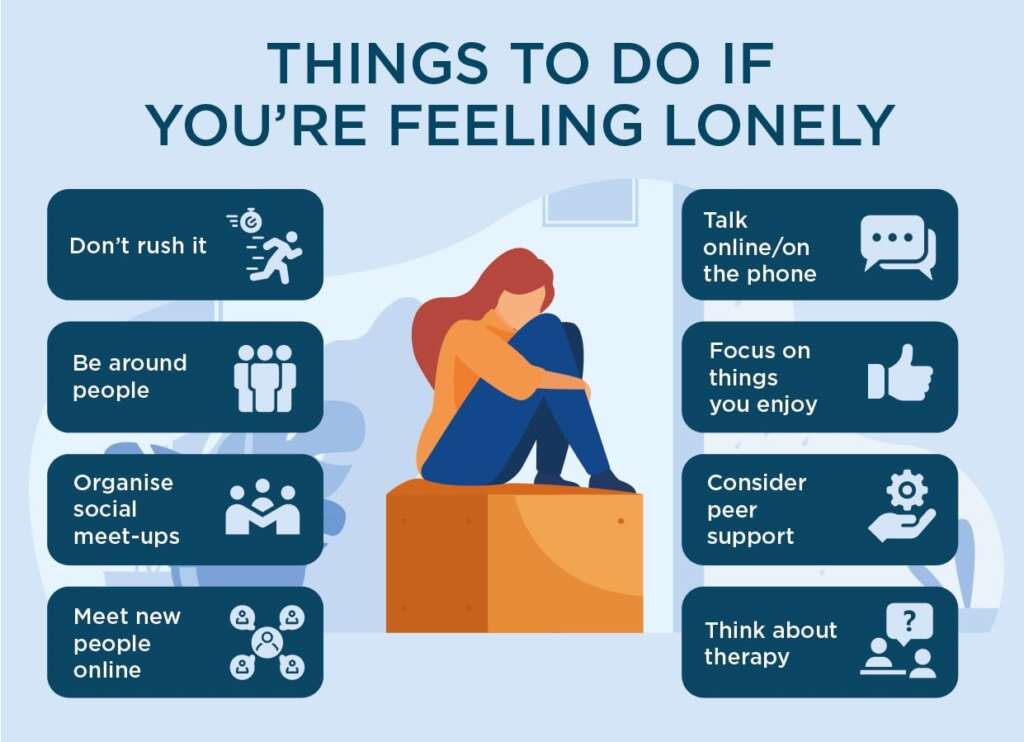There are many potential causes of loneliness, and they can be both internal and external. Internal causes may include low self-esteem, social anxiety, and depression, while external causes may include a lack of social support, geographic isolation, and life transitions such as retirement or the loss of a loved one. Understanding these causes can help us better recognize and address feelings of loneliness in ourselves and others.
Loneliness is a universal human experience that affects people of all ages, genders, and backgrounds. Although it is often associated with being alone, loneliness can also be experienced even when surrounded by others. It is a complex and multifaceted emotion that can have a significant impact on a person’s mental and physical health.
Inherent Human Nature
Loneliness is a universal human experience that is caused by a variety of factors. One of the primary causes of loneliness is inherent human nature. We are social creatures and have a natural need for social interaction and connection.
Social Creatures
As social creatures, we thrive on social interaction and connection. We are wired to seek out social relationships and form social bonds with others. Research has shown that social isolation and loneliness can have negative effects on our physical and mental health.

Need for Belonging
In addition to our social nature, we also have a need for belonging. We want to feel like we are part of a group or community. This need for belonging is evident in our social behavior, such as our desire to conform to social norms and our tendency to form groups based on shared interests or characteristics.
However, when we feel like we do not belong or are excluded from a group, it can lead to feelings of loneliness and isolation. This is why social rejection can be so painful and why feeling like we are not part of a community can be so detrimental to our well-being.
In conclusion, inherent human nature is one of the primary causes of loneliness. As social creatures, we have a natural need for social interaction and connection, and we also have a need for belonging. When these needs are not met, it can lead to feelings of loneliness and isolation.
Societal Influences
Loneliness is a complex issue that can be caused by a variety of factors. One of the most significant causes of loneliness is societal influences. Societal influences can be defined as external factors that impact an individual’s sense of belonging or social connectedness. In this section, we will discuss two societal influences that are contributing to loneliness in the modern world: Digital Age Isolation and Urbanization.
Digital Age Isolation
The rise of technology has brought about significant changes in how we interact with one another. While technology has made it easier to stay connected with others, it has also created new forms of isolation. Social media, for example, can create a false sense of connection while actually increasing feelings of loneliness. This is because social media often presents an idealized version of people’s lives, which can lead to feelings of inadequacy and loneliness in those who feel they cannot measure up.
Moreover, technology has made it easier to work remotely, which can lead to social isolation. Remote workers often lack the social interaction that comes with working in an office environment, which can contribute to feelings of loneliness and isolation.
Urbanization and Loneliness
Urbanization has also been identified as a factor contributing to loneliness. As more people move to cities, they often lose the close-knit communities that exist in smaller towns and rural areas. This can lead to feelings of social isolation and loneliness. Moreover, cities can be overwhelming and impersonal, which can make it difficult to form meaningful connections with others.
Additionally, urbanization has led to the breakdown of traditional family structures. As families become more geographically dispersed, people may feel disconnected from their family members, which can contribute to feelings of loneliness.
In conclusion, societal influences play a significant role in the development of loneliness. The Digital Age and Urbanization are two societal influences that are contributing to loneliness in the modern world. It is important to be aware of these influences and take steps to mitigate their impact on our lives.
Personal Factors

Loneliness can be caused by a variety of factors, including personal factors that are unique to an individual. Here are two personal factors that can contribute to loneliness:
Introversion and Solitude
Introversion is a personality trait that is characterized by a preference for solitary activities and a tendency to avoid social situations. While introverts may enjoy spending time alone, they may also experience feelings of loneliness if they do not have enough social interaction. Similarly, solitude can be a source of comfort for some people, but it can also lead to loneliness if it is prolonged or unwanted.
Mental Health Issues
Mental health issues such as depression, anxiety, and social anxiety disorder can also contribute to feelings of loneliness. These conditions can make it difficult for individuals to connect with others and engage in social activities. Additionally, the stigma surrounding mental health issues can make it challenging for individuals to seek help and support, which can exacerbate their feelings of loneliness.
It is important to note that not all introverts or individuals with mental health issues will experience loneliness, and not all lonely individuals are introverted or have mental health issues. However, these personal factors can increase the likelihood of experiencing loneliness and should be taken into consideration when addressing feelings of loneliness.
Life Events

Loneliness can be caused by a variety of factors, including life events that can lead to social isolation. These events can be difficult to cope with and can lead to feelings of loneliness and disconnection from others.
Bereavement
The loss of a loved one can be a significant cause of loneliness, especially for older adults who may have lost many of their friends and family members over the years. Coping with grief and adjusting to life without a loved one can be a long and difficult process, and it can be challenging to find new sources of social support.
Divorce or Relationship Breakdown

The end of a relationship can also be a significant cause of loneliness, especially if the individual had relied heavily on their partner for social support. Divorce or relationship breakdown can lead to feelings of isolation and disconnection from others, and it can be challenging to rebuild social networks and find new sources of support.
In conclusion, life events such as bereavement, divorce, or relationship breakdown can have a significant impact on an individual’s social connections and can lead to feelings of loneliness and isolation. Coping with these events can be challenging, but it is essential to seek out new sources of support and to stay connected with others to prevent long-term loneliness.
Physical Health and Age
Loneliness can be caused by a variety of factors, including physical health concerns, especially among the elderly population. As we age, our bodies become more susceptible to chronic illnesses. Chronic illnesses can lead to a decrease in mobility, which can result in decreased social interactions. This decrease in social interactions can lead to feelings of loneliness and isolation.
Chronic Illness
Chronic illnesses such as heart disease, depression, anxiety, and dementia can lead to feelings of loneliness. These illnesses can limit an individual’s ability to participate in social activities, leading to social isolation. This social isolation can cause feelings of loneliness and can exacerbate symptoms of the chronic illness.
Elderly Loneliness
Loneliness is a common problem among the elderly population. As we age, we may experience a decrease in social interactions due to factors such as retirement, decreased mobility, and the loss of loved ones. This decrease in social interactions can lead to feelings of loneliness and isolation.
It is important to note that loneliness can have a significant impact on physical health, possibly through pathways such as increased inflammation and decreased immune function. Studies have shown that loneliness in older adults is associated with increased mortality risk. Therefore, it is crucial to address the issue of loneliness in the elderly population to promote overall health and well-being.

How Negative Emotions Affect Your Health https://1111newme.com/2023/06/05/how-negative-emotions-affect-your-health-understand-the-link/


One reply on “Causes of Loneliness: Understanding the Root Factors”
Somebody essentially lend a hand to make significantly posts I might state That is the very first time I frequented your web page and up to now I surprised with the research you made to create this particular put up amazing Excellent job